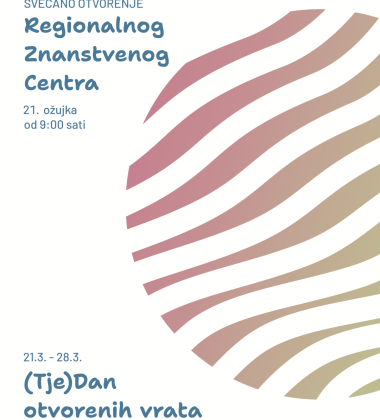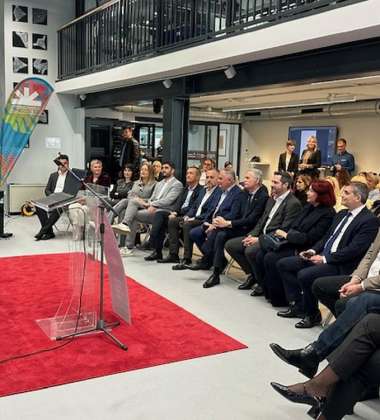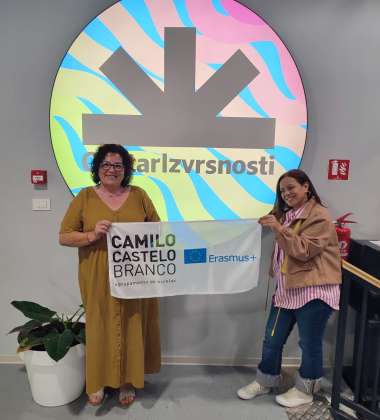Erasmus 5-Day Course: Introduction to Programming and Digital Tools for Teachers
Join us for a dynamic 5-day Erasmus course designed for teachers in grades 5-13 who want to improve their teaching methods through practical programming skills, digital tools and media literacy! Through 25 hours of intensive learning (Monday to Friday, 5 hours per day), we will equip you with the knowledge to integrate Scratch, LEGO Education tools and virtual reality into your teaching, with an emphasis on data protection and European educational standards. The course includes practical workshops in a classroom equipped with computers and VR glasses and a special half-day cultural trip to Trogir, where you will connect learning with cultural experience through a digital treasure hunt. Join us and empower your teaching for the digital age!
WHEN: November 3, 2025 – November 7, 2025
WHERE: RZC ADRIATIC/ Center of Excellence SDZ, Ruđera Boškovića 20, 21000 Split
PRICE: 400 euros per participant, minimum 8, maximum 16 participants
ORGANIZER: Center of Excellence SDZ OID:E10267990
ACCOMMODATION: Not included, the organizer can recommend hotels
REGISTRATION: by e-mail to dragansupe@ci-sdz.hr
Confirmation deadline: July 30, pending minimum number of participants
Detailed plan
Erasmus 5-Day Course: Introduction to Programming and Digital Tools for Teachers
Target Audience: Teachers of grades 5–13
Duration: 5 days (Monday–Friday), 5 hours per day (25 hours total)
Objective: Equip teachers with practical skills in programming, digital tools, and media literacy to enhance classroom teaching, with a focus on hands-on activities, data protection, and European educational standards.
Location: Classroom with access to computers, LEGO Education kits (WeDo 2.0, SPIKE Prime, Mindstorms), VR headsets, and internet.
Note: Wednesday includes a half-day cultural excursion, with extended hours on other days to meet the 25-hour requirement.
Day 1: Introduction to Programming and Scratch Basics (6 hours)
Objective: Understand basic programming concepts and apply them using Scratch in classroom settings.
Schedule: 9:00 AM–12:00 PM, 1:00 PM–4:00 PM
- 9:00–10:30: Introduction to Programming
- Overview of computational thinking: sequences, loops, conditionals.
- Relevance to grades 5–13 curricula (problem-solving, logical reasoning).
- Hands-on activity: Create simple algorithms using paper-based exercises.
- 10:30–10:45: Coffee break
- 10:45–12:00: Scratch: Coding for Beginners
- Introduction to Scratch interface and block-based coding.
- Hands-on activity: Create a simple animation or game (e.g., storytelling for grades 5–7, interactive math quiz for grades 8–13).
- Discussion: Integrating Scratch into subjects like math, science, and language arts.
- 12:00–1:00: Lunch break
- 1:00–2:30: Scratch in Practice
- Group activity: Design a Scratch-based lesson plan for a specific subject and grade level.
- Focus on data protection: Ensuring student privacy during activities (e.g., no personal data collection in projects).
- 2:30–2:45: Coffee break
- 2:45–4:00: Didactics and Methodology
- Strategies for scaffolding programming concepts for diverse learners.
- Sharing and peer-reviewing lesson plans.
Day 2: Advanced Scratch and Gamification (6 hours)
Objective: Deepen Scratch skills for complex projects and explore gamification tools to engage students.
Schedule: 9:00 AM–12:00 PM, 1:00 PM–4:00 PM
- 9:00–10:30: Advanced Scratch Programming
- Explore variables, loops, conditionals, and sprites in Scratch.
- Hands-on activity: Create a multi-scene project (e.g., interactive story for grades 5–7, science simulation for grades 8–13).
- 10:30–10:45: Coffee break
- 10:45–12:00: Cross-Curricular Scratch Projects
- Group activity: Develop a Scratch project integrating a non-STEM subject (e.g., history timeline, literature character dialogue).
- Discussion: Assessing student Scratch projects for learning outcomes.
- 12:00–1:00: Lunch break
- 1:00–2:30: Gamification with Kahoot and Quizlet
- Introduction to Kahoot and Quizlet for interactive quizzes and learning games.
- Hands-on activity: Create a Kahoot quiz and Quizlet set based on a subject taught by participants.
- Discussion: Gamification’s role in student motivation and engagement.
- 2:30–2:45: Coffee break
- 2:45–4:00: Didactics and Data Protection
- Strategies for integrating advanced Scratch and gamification into lesson plans.
- Data protection: Using GDPR-compliant platforms, anonymizing student inputs, and securing quiz data.
Day 3: LEGO Education and Cultural Excursion (3 hours + excursion)
Objective: Explore LEGO Education tools and connect learning to real-world contexts via a cultural excursion.
Schedule: 9:00 AM–12:00 PM, Afternoon: Cultural excursion
- 9:00–10:30: LEGO Education: SPIKE Prime
- Introduction to SPIKE Prime: hardware, sensors, and coding.
- Hands-on activity: Build and program a simple model (e.g., SPIKE Prime robotic arm).
- 10:30–10:45: Coffee break
- 10:45–12:00: LEGO Education: Mindstorms
- Introduction to Mindstorms for advanced projects (grades 10–13).
- Hands-on activity: Program a Mindstorms robot to complete a task (e.g., obstacle avoidance).
- Discussion: Cross-curricular applications (e.g., physics, engineering).
- 12:00–1:00: Lunch break
1:00–3:30: Excursion to Trogir
- Activity: Digital Scavenger Hunt in Trogir’s Historic Center
- Participants explore Trogir’s picturesque old town, including landmarks like the Cathedral of St. Lawrence, Kamerlengo Fortress, and the waterfront.
- Using a mobile app (e.g., Actionbound or a similar GDPR-compliant scavenger hunt tool), participants complete fun tasks, such as:
- Taking photos of historic sites to create a digital story (connecting to Book Creator).
- Solving puzzles inspired by coding logic (e.g., sequencing tasks to “unlock” the next location).
- Answering quiz questions about Trogir’s history using Kahoot on their phones.
- The activity encourages teamwork, creativity, and the use of digital tools in a real-world context, loosely tying to the seminar’s focus on programming and digital applications.
Day 4: Digital Tools, Apps, and VR Basics (6 hours)
Objective: Master digital tools and VR for classroom use, emphasizing practical applications.
Schedule: 9:00 AM–12:00 PM, 1:00 PM–4:00 PM
- 9:00–10:30: Helpful Apps and Tools
- Introduction to Book Creator for interactive storytelling and project documentation.
- Hands-on activity: Create a digital book integrating student coding projects.
- Overview of other tools: Canva (visual aids), Padlet (collaboration).
- 10:30–10:45: Coffee break
- 10:45–12:00: VR Masks: Technical Basics
- Overview of VR hardware (e.g., Oculus Quest, Google Cardboard) and classroom applications.
- Hands-on activity: Explore a VR educational app (e.g., virtual science labs, history tours).
- Discussion: Practical considerations (cost, safety, accessibility).
- 12:00–1:00: Lunch break
- 1:00–2:30: Didactics and Methodology
- Strategies for integrating digital tools and VR into lessons for grades 5–13.
- Group activity: Design a lesson plan using Book Creator or VR for a specific subject.
- 2:30–2:45: Coffee break
- 2:45–4:00: Data Protection in Digital Tools
- European data protection regulations (GDPR): Ensuring compliance in app usage.
- Practical tips: Secure account management, parental consent, and data minimization.
Day 5: Media Literacy and Final Project (4 hours)
Objective: Address media literacy, data protection, and consolidate learning through a final project.
Schedule: 9:00 AM–1:00 PM
- 9:00–10:30: Media Literacy and Media Education
- Topics: Data protection, cyberbullying, fake news, and critical media evaluation.
- Hands-on activity: Analyze a fake news article and create a classroom activity to teach media literacy (e.g., fact-checking exercise).
- 10:30–10:45: Coffee break
- 10:45–12:00: Final Project Development
- Group activity: Design an integrated lesson plan combining programming (Scratch/LEGO), digital tools, and media literacy for grades 5–13.
- Focus on GDPR compliance and student engagement.
- 12:00–1:00: Project Presentations and Wrap-Up
- Groups present lesson plans and receive peer feedback.
- Discussion: Implementing course learnings in participants’ schools.
- Distribution of certificates and course evaluation.
Notes
Assessment: Participants create and present lesson plans, demonstrating practical application of course content.
Hands-on Focus: Each day includes practical activities to ensure teachers can apply skills directly in classrooms.
Data Protection: Emphasized throughout, aligning with European GDPR standards (e.g., anonymizing student data, using secure platforms).
Cross-Curricular Relevance: Activities are designed to integrate with subjects like math, science, history, and language arts for grades 5–13.





